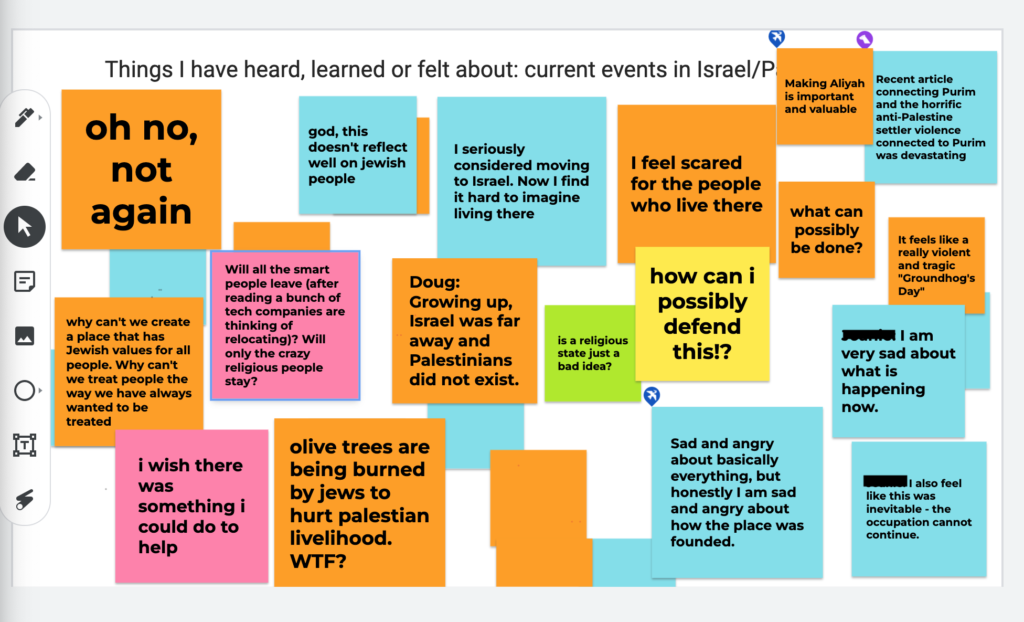NOTE: I had been meaning to write this up for a while. Just happened I found the time yesterday, just before news broke of the Israeli Parliament’s vote to overhaul the country’s judiciary. – Jodi Kushins, KSS Board Chair
For years, KSS has wrestled with how to host meaningful study and conversation amongst our members about Israel-Palestine. For a long time, this meant we didn’t talk about it because we weren’t sure how or where to start. We had a general sense that most members felt some connection to Israel but also felt challenged by actions the government has taken – in recent times and since the founding of the state in 1948. We also know there are members who call themselves Zionist and couldn’t imagine why the congregation as a whole might not identify as such.
Last year, as Netanyahu was re-elected and the political situation in Israel took another turn to the right, we decided we had to start somewhere. We started with Reconstructionist Rabbinical College (RRC) student and past KSS High Holiday Guest Spiritual Leader Alana Krivo-Kaufman on a two-part adult learning series. Alana was a perfect fit for this endeavor given her experience as an organizer with Jewish Voice for Peace and Jews for Racial and Economic Justice and her more recent work as RRC Racial Justice Rabbinic Intern for which she organized a Day of Learning on Reparations for the movement. In addition, she had a sense of us as a congregation having spent the holidays with us.
The sessions Alana designed helped those in attendance unpack our perspectives and start a conversation. The exercises we did, many of which allowed anonymous participation, were valuable and something worth repeating with a larger audience.
In June, members came together again over Shabbat dinner to further the discussion. The meeting was planned as a follow-up to a presentation sponsored by Canada’s three Reconstructionist congregations: Darchei Noam (Toronto), Dorshei Emet (Montreal), and Or Haneshamah (Ottawa), and co-sponsored by Reconstructionists Expanding Our Conversation on Israel/Palestine – an independent series created by congregations across North America – by acclaimed novelist, screenwriter, and journalist Sayed Kashua, who spoke about “Being a Palestinian in a Jewish State: Israel’s Paradoxical Relationship with its Arab Citizens.” Only two of the ten people in attendance at our discussion had attended Kashua’s talk, but the other eight still came for the discussion. This served as a testament to the desire to talk about Israel-Palestine within our community, even when it can be difficult to do so.
The two members who were able to hear Kashua speak provided a brief overview and what they took away from his remarks. Kashua’s life and work present an interesting touch point for exploring the lived experience of Palestinians living under Israeli rule, in the land of Israel, not just the West Bank and Gaza. Others asked questions, some of which evolved into tangential but important discussions about the history of democracy in Israel and the challenges faced by Jewish and Arab Israelis today with regard to just representation. Again, we didn’t come to any conclusions; some left with more questions than they brought to the table at the start of the evening. But for an hour we talked and shared openly our hopes and fears for a country far away that we feel tied to, in some way or another. The Kabbalat Shabbat service we shared following the dinner discussion felt all the more potent for our little minyan.
We continue to work towards a statement we can highlight on this website that lets visitors and new members know that as a community we embrace cognitive dissonance around the state of Israel. We hold at the same time the fact that the founding of the state of Israel was a liberatory moment for the Jewish people AND a horrible (catastrophe) for Palestinians who were uprooted from their homes in the nakba. Along with Reconstructionists Expanding Our Conversation on Israel/Palestine, we recognize that, just as here in the United States, questioning those in power is one sign of a strong democracy. We yearn for and will continue to look for opportunities to host conversations on Israel-Palestine that enrich understanding, invite multiple points of view, and build trust and belonging.


